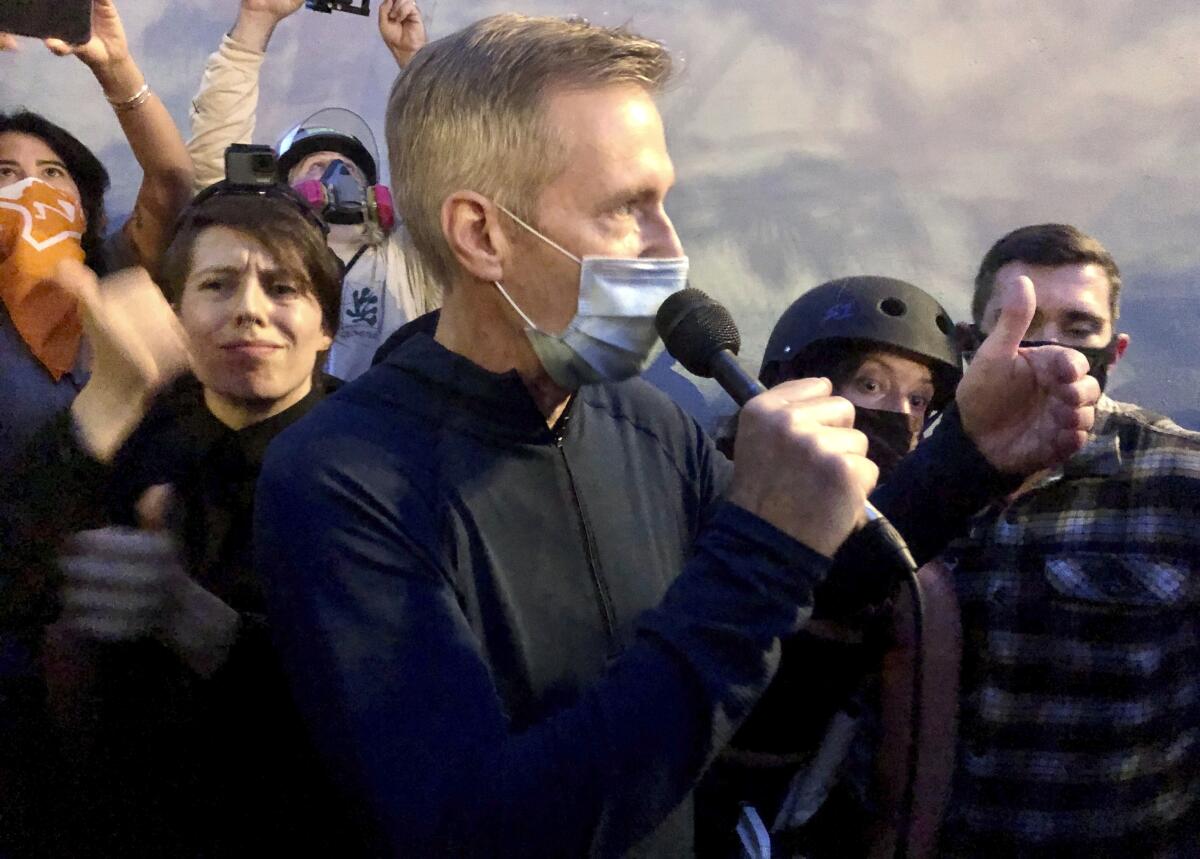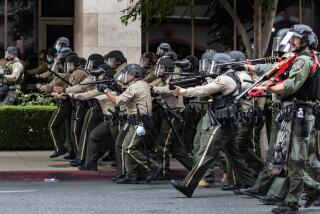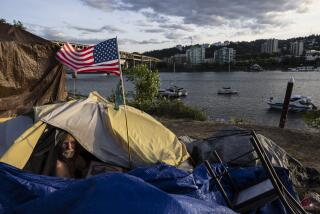Editorial: Portland killing underscores complexity of protests and leadership

There is still much to be learned about the brutal killing Saturday night in Portland, Ore., of Aaron “Jay” Danielson. But there can be little doubt that with his violent death and many others in U.S. cities over the last three months, we are witnessing multiple failures of leadership and a fearsome unraveling of the fabric of civility that binds our nation together.
Danielson was shot to death on the street at the tail end of a contentious political rally that he may have attended in association with a right-wing organization that routinely demonstrates in Portland.
It might be tempting for those who sympathize with protests on the other side of the political spectrum to take his killing in stride or chalk it up to a settling of scores after the Kenosha, Wis., killings a week earlier. Authorities there allege that Joseph D. Rosenbaum and Anthony M. Huber were shot to death by a 17-year-old Illinois boy who was on the scene with a group intending to defend property from protesters ostensibly aligned with Black Lives Matter. But this is Americans killing each other. It is suicide. It must stop.
The first responsibility of government is to protect the people — their bodies, their rights, their sense of safety and security. It’s often a delicate and dangerous balance, and it has been so consistently since May 25, when a Minneapolis police officer knelt on George Floyd’s neck until he was dead. Outraged Americans quickly took to the streets to demonstrate their anger at not just the latest police killing of an unarmed Black person but at the many previous deaths that had too often been brushed aside in the public mind, like the March killing of Breonna Taylor in Louisville, Ky.
Some protests were accompanied by destruction of property, which cannot be countenanced — but which properly takes a lower priority than protecting human life. Elected leaders and, if we are honest with ourselves, some police officers sympathized with and even shared in the outrage over Floyd’s killing and over needlessly dangerous and violent police tactics. Protests that in other times might have been shut down earlier because of accompanying destruction were allowed to continue, perhaps in solidarity and perhaps in recognition that the outrage could not be contained.
Some tactics seemed foolhardy, at the time or in retrospect. The six-block Seattle area variously known as the CHAZ or the CHOP, depending on whether the area in the Capitol Hill neighborhood was the “autonomous zone” or the “organized protest,” was at one point described by the city’s mayor as a block party. Protests were directed at police, who left their station in order to de-escalate the tension. Some protesters intended the zone to exemplify the benefits of a self-governing world without police, and for a short while it was, until it wasn’t. Two teenagers in the zone were shot, one fatally, and the police returned.
Portland’s protests were needlessly exacerbated by the presence of federal agents, who made arrests well away from the courthouse they supposedly were protecting from destructive demonstrators.
In both cases, and in others besides, President Trump’s statements and actions harmed more than helped, but that’s no surprise. That’s his nature. And what about Portland Mayor Ted Wheeler, Oregon Gov. Kate Brown, Seattle Mayor Jenny Durkan and Washington Gov. Jay Inslee? Did they make all the right moves under difficult circumstances? Probably not, although it’s hard to say. Have their constituents lost lives and property, and did they leave residents feeling that things had gotten out of hand? They did — and the fact that Trump also says so does not make it untrue.
In an emergency, one of government’s tools to protect our bodies and our rights is our police, yet here’s our quandary: It is the brutality of police, and the societal racism that they reflect, that are being protested. So how can they protect us? It is a police officer who knelt on Floyd, who shot Taylor in her own home, who appears to have pumped seven bullets into Jacob Blake’s back.
Yet protect us they must. The alternative to a world without police may briefly look like a block party, but it’s at least as likely to involve militias or armed individuals coming to town to fill the vacuum, as Kyle Rittenhouse is alleged to have done in Kenosha, and being met by people like the one under investigation for the killing of Danielson in Portland. We cannot control or restrain armed criminals or self-styled militia fighters who insert themselves when the authorities cede the field, and our ability to punish them after the fact is too little, too late. But we can, with effort, take better control of the police we hire, train, arm and pay to protect and serve us. They have to do much better. As do all of us.
More to Read
A cure for the common opinion
Get thought-provoking perspectives with our weekly newsletter.
You may occasionally receive promotional content from the Los Angeles Times.










